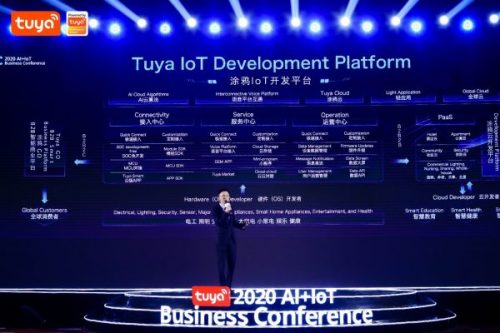(IoTNewsNet.com – Sponsored News) The logistics industry has long been a cornerstone of human progress but ironically has been one that is highly resistant to technological innovation and implementation. Change is often slow and expensive. In the time of a global pandemic crisis, it is natural for businesses to clam up and be afraid of change.
At the recent AI+IoT Business Conference co-hosted by Tuya Smart, a leading IoT global platform together with Asia Pacific Intelligent Business Alliance (AIBA), many of the industry leaders from Google, Lenovo, Gree, TCL, Zigbee Alliance and more shared their thoughts for the AIoT implementation outlook in various industries. Here are some takeaways that will impact the global supply chain in the near future.
AI, IoT and cloud connectivity are the main technologies that will push the logistics industry forward
Digital transformation is progressively turning into smart automation, while the increasingly growing digital ecosystem of enterprises and factories is turning into a more tightly connected and organic structure. The very notion of automation is being challenged and it will resemble more like a web of interconnected devices compared to the traditional ‘chain’ model.
However, COVID-19 has forced many companies to take a second and closer look at their technological capabilities, and the logistics industry is particularly at risk. During one of the global roundtables hosted by Jeff Immelt, former CEO and Chairman of GE, Venture Partner of NEA, now Tuya’s US Chairman, he commented after the talk with executives from Lenovo, Havells, Merkury, and Status, that AIoT “is really a pervasive theme. I think the good news for smart homes is everybody is sitting at home and finally they figure out how all these devices work. Basically now, more consumers are aware of the technologies. One truth is that the world is going to change; there is challenges; but the other truth is that there is going to be big opportunities.”
IoT and AI are two independent technologies that have a significant impact on logistics and the global supply chain. While IoT is the digital nervous system, AI becomes the brain that makes decisions which control the overall system. Logistics is less about moving objects but rather a network that delivers intelligent and connected systems that are capable of connecting consumers with retailers and suppliers.
The time to invest in AloT is now as logistics companies are increasingly employing edge computing technology in their warehouses and vehicles. Consumers are also buying WiFi-enabled household goods like fridges and TVs, and as the web grows, there are two distinct benefits that supply chain companies globally can enjoy from this innovation.
Intel recently did a survey noted that business intelligence (33%), near-real-time monitoring and visibility (31%), and condition-based monitoring (30%) topped the list of analysis techniques used with IoT projects.
These techniques have direct benefits to the logistics and supply chain industry. Companies that have developed AIoT capabilities report stronger results across critical organisational goals including the ability to speed up operations, introduce new digital services, improve employee productivity and decrease costs. For example, companies using IoT data to speed up operations without AI saw a 32% increase; companies adding AI to the mix saw speeds improve by 53%.
Now platforms choses company like Tuya who provides platform for business to develop their services scopes with various SaaS services, from commercial lighting, to hotel, apartment, healthcare system, etc. with such service dashboard, more business have access to their user data, and logistics status from all kinds, so as to better improve their understanding of the market and in the vertical.
Benefits of AIoT for logistics companies
The first is data collection and connectivity. As more devices are linked together providing a seamless experience to the user, companies can use the data collected legally to better understand and enhance the movement of goods. At the event, Tuya’s President and Co-Founder Leo Chen introduced the Tuya Cloud Manufacturing system, which is based on PMS production system of factories. This system is developed for factories to manage production tasks and check production status remotely, which effectively reduces the number of production abnormalities by 55% as well as shortens the delivery time by 32%.
The second benefit is the IoT perspective where latency is a major consideration; what happens when something happens that requires an instant response? If you’re sending that enquiry back to the cloud to be processed and then need to send a response back, that probably isn’t going to be fast enough.
Over the last 20 years, technology has disrupted everything from print and film, to music. Some have handled disruption well, others have gone under, and the logistics industry cannot afford to be stubborn and persist with the same ideas it’s been peddling for the last 30 years for the next 30. AIoT is mature enough and has seen many successful use cases, from Amazon in the US to Tokopedia online marketplace in south-eastern Asia. AloT offers the opportunity to underlay smart cities and smart transport networks with the same network architecture – the level of interoperability that could provide can only be a good thing.

